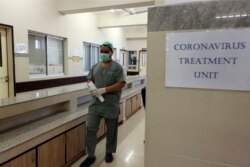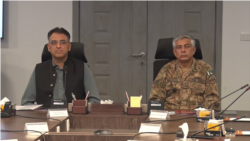Pakistan said Wednesday hundreds of health workers are among more than 15,000 people who have contracted coronavirus in the country, and at least three doctors are also among 335 killed by the disease, known as COVID-19.
Top government officials shared the details while speaking to reporters at the newly established National Command and Operation Center (NCOC), which is coordinating and directing Pakistan’s battle against the pandemic.
“Pakistan currently has about 480 health personnel who have been infected. This is a cause of great concern for us,” Federal Health Minister Zafar Mirza said. He added that three doctors also have died since the COVID-19 outbreak hit the country in late February.
Mirza said the government has continued to strengthen supplies of personal protection equipment for health personnel to ensure safety of “these frontline workers” providing critical care to patients across the country.
It’s estimated there are more than 220,000 doctors and fewer than 150,000 nurses in Pakistan. Mirza said the government, however, is providing safety equipment to only those who are directly handling patients of coronavirus.
The government, he said, also has announced a national program for health workers who lose their lives while handling COVID-19, giving their families financial compensations and the status of “martyr.”
Cabinet minister Asad Umar, who heads the NCOC, acknowledged the number of confirmed nationwide cases and fatalities have sharply increased in recent days. But he attributed the rise to a substantial increase in the number of tests from fewer than 500 a day to nearly 8,500 a day.
“What we also know for sure that the number of deaths are way below the original projections,” he noted. Umar was referring to initial government assessments that had placed the number of infections in Pakistan at about 50,000 and the number of deaths at 10,000 by the end of April.
He suggested the low level of cases could be due to a higher level of immunity among people in developing countries like Pakistan, where environmental conditions and intake of water and food are not as clean as they are in developed nations, so people’s resistance is higher.
While the health impact is less disastrous, Umar said, the ensuing pandemic related economic lockdown has affected most of the population in Pakistan, where “one-third lives below the poverty line and one-third just above the poverty line.”
The NCOC chairman noted, though, that the restrictions on economic and industrial activities are being gradually eased to help restore income and livelihood means for tens of millions of daily wagers to save their families from starvation.
The government has rolled out the country’s largest ever relief package of nearly $1 billion to give more than $70 each to 12 million poverty-stricken families across Pakistan. Umar said 7 million of the families already have received the cash grant.
Special financial relief programs also have been launched to compensate laborers and small businesses, which would benefit an estimated 70 million people, he said.
Officials defended a government decision to allow congregations and prayers in mosques during the ongoing fasting month of Ramadan, saying organizers are being instructed to strictly implement social distancing and to disinfect the places of worship.
The Pakistani government has received harsh criticism for allowing the religious gatherings that critics say could become a major source of spreading the coronavirus throughout the nation of more than 220 million.






